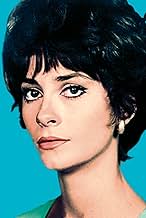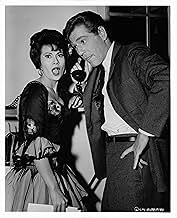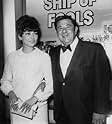IMDb-BEWERTUNG
7,0/10
7397
IHRE BEWERTUNG
Füge eine Handlung in deiner Sprache hinzuA varied group of passengers boarding a ship bound for pre-WWII Germany represents a microcosm of early-1930s society.A varied group of passengers boarding a ship bound for pre-WWII Germany represents a microcosm of early-1930s society.A varied group of passengers boarding a ship bound for pre-WWII Germany represents a microcosm of early-1930s society.
- Regie
- Drehbuch
- Hauptbesetzung
- 2 Oscars gewonnen
- 5 Gewinne & 13 Nominierungen insgesamt
José Ferrer
- Siegfried Rieber
- (as Jose Ferrer)
José Greco
- Pepe
- (as Jose Greco)
Heinz Rühmann
- Julius Löwenthal
- (as Heinz Ruehmann)
Empfohlene Bewertungen
Vivien Leigh sits opposite redneck Lee Marvin in the ship's upper deck restaurant, Marvin confesses to Leigh he never new what a Jew was until he was 15, "You were too busy lynching blacks" is her replay. I thought to mention it just to give you a hint of the sort of cruise ship we're travelling on. We sail through a sea that goes from the sublime to the ridiculous. Abby Mann is a master at drawing characters with long shadows and Kramer a master at capturing them. Think "Judgement at Neuremberg" Here you'll feel sea sick sometimes but the trip is worth taking. I mean. Vivien Leigh and Lee Marvin in a sad comedy of errors. Simone Signoret as a drug addicted countess and Oskar Werner her kindly, tragic, doctor, pusher. Highly charged, beautifully written moments. The lower decks for the down trodden is full of extras. George Segal and Elizabeth Ashley try both decks and and a deck all their own with melodramatic regularity. Jose Ferrer and Heinz Rhumman have one of my favourite exchanges. Ferrer, the German military tells Rhumman, the German Jew, that he should admit that the Jews are great part of the German problem. Rhumman calmly agrees and ads "true, but not only the Jews, also men who smoke the pipe are great part of the German problem" "Why men who smoke the pipe?" Shouts Ferrer. To what Rhumman replies "Why the Jews?" Michael Dunn addresses us directly, asking us to find ourselves among the passengers. Okay.
Ship of Fools (1965) directed by Stanley Kramer, is based on the novel by Katherine Anne Porter. The film is a reasonably faithful cinematic adaptation, although it lacks the novel's subtlety and complexity. Director Kramer assembled an all-star cast--including Vivien Leigh (her last film), Simone Signoret, José Ferrer, Lee Marvin, Oskar Werner, José Greco, and George Segal.
The film takes place entirely on shipboard, except for the final scene. Naturally, the close confines of the ship and the lack of privacy bring about forced interactions, as would have been the case in reality. These interactions form the basic plot of both the book and the film.
The time is 1933, so the passengers don't know what we know--things are changing rapidly in Germany and everything will be different in just a year or two. In fact, that's the basic weakness of the plot--it's easy in retrospect to know just how wrong the Jewish salesman is when he assures people that the current unpleasantness will blow over and all will be well.
Some features of the novel were unfortunately omitted from the film, especially the roles of the Spanish twins, Ric and Rac. In the novel, they are the embodiments of senseless evil, and every chapter in which they appear is laden with foreboding. In the film, the children commit one evil act, but it makes no sense because we haven't been prepared for it.
Director Kramer made one choice I consider foolish. In the novel, a young woman named Elsa Lutz is realistically unhappy. She is unattractive, not very intelligent, not gifted or graceful, and her prospects for marriage are bleak. In the film, she is portrayed as a stunning ingénue, who will blossom into an even more stunning woman. No dramatic tension there. Porter had it right, Kramer had it wrong.
All in all, "Ship of Fools" is a classic movie by an excellent director and it's loaded with stars. It's not an essential film, but it's entertaining enough and worth renting.
The film takes place entirely on shipboard, except for the final scene. Naturally, the close confines of the ship and the lack of privacy bring about forced interactions, as would have been the case in reality. These interactions form the basic plot of both the book and the film.
The time is 1933, so the passengers don't know what we know--things are changing rapidly in Germany and everything will be different in just a year or two. In fact, that's the basic weakness of the plot--it's easy in retrospect to know just how wrong the Jewish salesman is when he assures people that the current unpleasantness will blow over and all will be well.
Some features of the novel were unfortunately omitted from the film, especially the roles of the Spanish twins, Ric and Rac. In the novel, they are the embodiments of senseless evil, and every chapter in which they appear is laden with foreboding. In the film, the children commit one evil act, but it makes no sense because we haven't been prepared for it.
Director Kramer made one choice I consider foolish. In the novel, a young woman named Elsa Lutz is realistically unhappy. She is unattractive, not very intelligent, not gifted or graceful, and her prospects for marriage are bleak. In the film, she is portrayed as a stunning ingénue, who will blossom into an even more stunning woman. No dramatic tension there. Porter had it right, Kramer had it wrong.
All in all, "Ship of Fools" is a classic movie by an excellent director and it's loaded with stars. It's not an essential film, but it's entertaining enough and worth renting.
A modernist morality tale with several different dark, sardonic stories. It creates a strange mood with its post WWII sensibility superimposed on pre-Nazi German culture. It's like The Love Boat as told by Ambrose Bierce. The best story revolves around Oskar Werner as he takes care of Simone Signoret. He sits at her bedside and listens with his head at a ridiculous angle to show his complete understanding - their situations are parallel, but their compositions are worlds apart. His slow slide into oblivion is fascinating to watch.
But the best performance belongs to Vivien Leigh in her final film role. She is absolutely stunning as "the 46-year old coquette" (as Werner Klemperer puts it). It's a terrible tragedy that she was not able to make very many movies in her career.
However, I have never cared for George Segal or Elizabeth Ashley and they weaken the film - particularly Segal who seems overmatched by the other members of the cast. But I did enjoy the rest of the movie and it's well worth getting through their story to see it.
But the best performance belongs to Vivien Leigh in her final film role. She is absolutely stunning as "the 46-year old coquette" (as Werner Klemperer puts it). It's a terrible tragedy that she was not able to make very many movies in her career.
However, I have never cared for George Segal or Elizabeth Ashley and they weaken the film - particularly Segal who seems overmatched by the other members of the cast. But I did enjoy the rest of the movie and it's well worth getting through their story to see it.
Abby Mann, who also wrote 'Judgement at Nuremburg' for director Stanley Kramer, has here condensed the novel of Katherine Anne Porter to a little under two and a half hours but it still seems a wee bit on the long side. The weakest link is the on/off romance of the angst-ridden artist of George Segal and the insecure girlfriend of Elisabeth Ashley which becomes rather tiresome. The strongest link is the relationship between ship's doctor Schumann and La Condesa. Oskar Werner and Simone Signoret are simply stupendous and their chemistry is palpable. They are greatly aided by having beautifully written roles and the touching music of Ernest Gold. Werner received recognition for his performance from the New York Critic's Circle. At one point she asks him 'Are you happy?' His response 'Who is?' has a world of meaning.
Mention has to be made of Vivien Leigh who plays a lady 'entre deux ages' as the French diplomatically say. Kramer paid tribute to her courage in taking on the role despite her physical and mental problems. Needless to say her nuanced performance oozes class. She picked up a well-deserved 'L'Etoile de Cristal' before this award was renamed the César.
Among the uniformly excellent performances is that of Heinz Ruemann as Lowenthal, an incorrigible optimist who has chosen to go back to Germany in 1932! When asked about his fellow German Jews he asks: 'What are they going to do, kill us all?' Ruemann's presence in this film is fascinating for although he always asserted that he was a fervent anti-Nazi he certainly had a close association with Hitler and his circle. The fact that he was one of Germany's most popular actors and was married to actress Hertha Feile who was quarter Jewish no doubt enabled him to seemlessly continue his career after the war.
Despite its longeurs this is a piece that leaves a deep impression as we can all relate to the guilts and regrets of these characters. In response to Schumann's 'I haven't lived' the Captain asks 'Who has?'
Sorry to say the author disliked the finished product but in the world of film adaptations that is par for the course!
Mention has to be made of Vivien Leigh who plays a lady 'entre deux ages' as the French diplomatically say. Kramer paid tribute to her courage in taking on the role despite her physical and mental problems. Needless to say her nuanced performance oozes class. She picked up a well-deserved 'L'Etoile de Cristal' before this award was renamed the César.
Among the uniformly excellent performances is that of Heinz Ruemann as Lowenthal, an incorrigible optimist who has chosen to go back to Germany in 1932! When asked about his fellow German Jews he asks: 'What are they going to do, kill us all?' Ruemann's presence in this film is fascinating for although he always asserted that he was a fervent anti-Nazi he certainly had a close association with Hitler and his circle. The fact that he was one of Germany's most popular actors and was married to actress Hertha Feile who was quarter Jewish no doubt enabled him to seemlessly continue his career after the war.
Despite its longeurs this is a piece that leaves a deep impression as we can all relate to the guilts and regrets of these characters. In response to Schumann's 'I haven't lived' the Captain asks 'Who has?'
Sorry to say the author disliked the finished product but in the world of film adaptations that is par for the course!
A strange, rather offbeat morality tale from Katherine Anne Porter's bulky novel, SHIP OF FOOLS manages to hold interest even though the characters are never fully realized and the full potential of the novel isn't to be found in the screenplay.
It's best described as a multi-episode GRAND HOTEL at sea, episodic with the love story between Simone Signoret and Oskar Werner at the core and easily the best acted piece, despite the soap-opera overtones. Vivien Leigh's bitter American widow is somewhat theatrical--but comes to life finally in the scene where she uses her shoe to beat Lee Marvin when he makes drunken advances to her. She looks somewhat worn and fragile (which the role requires) and this was her last film only two years before her death.
Porter's novel made diabolic use of the twin children who are almost missing from the screenplay. George Segal and Elizabeth Ashley are wasted in lesser roles as young romantics. Michael Dunn is sly and altogether winning as the dwarf who opens and closes the film with his narrative. Charles Korvin is excellent as the ship's Captain who is constantly giving advice to Oskar Werner who stubbornly refuses to listen to his well meaning friend.
If the story interests you, try reading the novel--much more complex, much richer in characters and atmosphere. The film is overlong, has some dull stretches and has a meager score by Ernest Gold that is oddly silent during some of the most emotional moments. A good old-fashioned musical score by someone like Max Steiner would have helped immeasurably in getting over the dull spots.
Summing up: too preachy when dealing with anti-semitism and lacks the punch of the novel.
It's best described as a multi-episode GRAND HOTEL at sea, episodic with the love story between Simone Signoret and Oskar Werner at the core and easily the best acted piece, despite the soap-opera overtones. Vivien Leigh's bitter American widow is somewhat theatrical--but comes to life finally in the scene where she uses her shoe to beat Lee Marvin when he makes drunken advances to her. She looks somewhat worn and fragile (which the role requires) and this was her last film only two years before her death.
Porter's novel made diabolic use of the twin children who are almost missing from the screenplay. George Segal and Elizabeth Ashley are wasted in lesser roles as young romantics. Michael Dunn is sly and altogether winning as the dwarf who opens and closes the film with his narrative. Charles Korvin is excellent as the ship's Captain who is constantly giving advice to Oskar Werner who stubbornly refuses to listen to his well meaning friend.
If the story interests you, try reading the novel--much more complex, much richer in characters and atmosphere. The film is overlong, has some dull stretches and has a meager score by Ernest Gold that is oddly silent during some of the most emotional moments. A good old-fashioned musical score by someone like Max Steiner would have helped immeasurably in getting over the dull spots.
Summing up: too preachy when dealing with anti-semitism and lacks the punch of the novel.
Wusstest du schon
- WissenswertesVivien Leigh was subject to bouts of depression and alcoholism and was abrasive to fellow actors. There was a rocky start to her relationship with Lee Marvin, complaining about his stale alcohol breath. Eventually, the two became highly unlikely good friends.
- PatzerAlthough set in 1933, the hairstyles and costumes are decidedly mid-1960s.
- VerbindungenEdited into Spisok korabley (2008)
Top-Auswahl
Melde dich zum Bewerten an und greife auf die Watchlist für personalisierte Empfehlungen zu.
- How long is Ship of Fools?Powered by Alexa
Details
Box Office
- Budget
- 4.000.000 $ (geschätzt)
- Weltweiter Bruttoertrag
- 206 $
- Laufzeit2 Stunden 29 Minuten
- Farbe
- Sound-Mix
- Seitenverhältnis
- 1.85 : 1
Zu dieser Seite beitragen
Bearbeitung vorschlagen oder fehlenden Inhalt hinzufügen

Oberste Lücke
By what name was Das Narrenschiff (1965) officially released in India in English?
Antwort







































